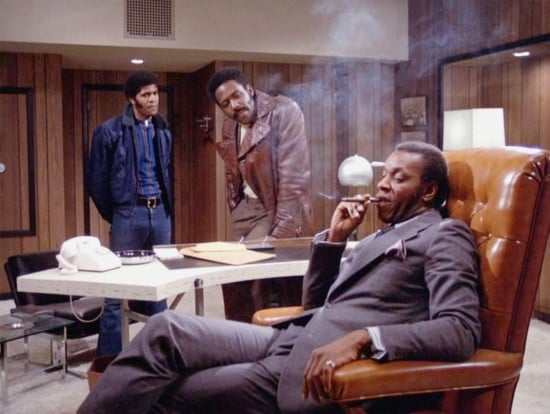Moses Gunn
By:
October 2, 2014

As if acting weren’t difficult enough, consider the struggles of a great — and principled — black actor like MOSES GUNN (1929–93). The eldest of seven children, he grew up in St. Louis, Missouri, his father a junkman; his mother illiterate, loving, dead of pneumonia when Gunn was twelve. His family fractured, Gunn hoboed, returned, and was taken in by his (segregated) high school English teacher, Jewel Richie, who strongly encouraged his literary interests. Drama studies at Tennessee State — interrupted by three years Army service — and graduate school at Kansas University followed. In spring 1962, Gunn was in New York, broke, and applying for straight jobs when he auditioned for Jean Genet’s The Blacks, then entering its second year at the St. Mark’s Playhouse. Impressive in bearing and diction, Gunn became The Governor, the first of many roles which together trace a Civil Rights-era alternate history, including: Martin Duberman’s “documentary play” In White America (1963), the black music and poetry revue A Hand Is On The Gate (1966), and Archie Shepp’s Junebug Graduates Tonight (1967). In 1967, Gunn co-founded the Negro Ensemble Company, and it was here — and in Shakespeare — that he would find works commensurate with his ability and ethics. Playing Bumpy Jonas in Gordon Parks’ two Shaft movies aside, Gunn refused blaxploitation’s false promises, keeping his eyes on better prizes. “It was a tremendous challenge,” Gunn observed of his 1976 role in the Martin Luther King bio-play I Have A Dream. “Here’s a man who I feel was an intellectual radical.”
The Hot Rock (1972)
Shaft’s Big Score (1972)
Good Times, “A Stormy Relationship” (1977)
***
On his or her birthday, HiLobrow irregularly pays tribute to one of our high-, low-, no-, or hilobrow heroes. Also born this date: A.E. Waite, Jack Parsons.
READ MORE about members of the Postmodernist Generation (1924-33).
